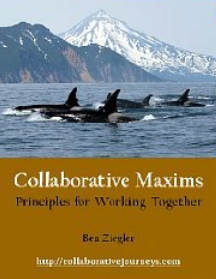A few weeks back, I passed my 1-year anniversary as a blogger. Knowing how important it is (so Seth Godin says in Linchpin) to ship, to execute, I thought I’d do some (humble) shipping of my own.
Yesterday, I published an e-book
Collaborative Maxims: Principles for working together in an organization
(You can purchase the latest Kindle edition of this e-book, for $1.99, on Amazon, here. )
Inspiration for this e-book comes from all the interesting people (yes, including you!), organizations, ideas, and stories I’ve been pleasantly exposed to during the past year. The e-book also draws heavily on my work as a mediator, helping people and organizations build consensus and move forward together. These days, I tend to observe just about everything through the lens of mediation.
My e-book is of course about collaboration.
Collaboration is about people working together. A maxim is a general truth, fundamental principle, or rule of conduct. (Merriam-Webster definition).
My e-book gives (19) maxims for good collaboration. The real success stories of our time are about good collaboration: businesses, sports teams, political campaigns, causes
I group the maxims into two broad categories; relationships and leadership.
Use the maxims in this e-book as a guide, to good collaboration, and what it means to think and act collaboratively. Use these maxims in your organizations of choice. Believe and follow these maxims regularly, and you’ll nurture your collaborative habits.
I hope you get some enjoyment, insight, and/or positive vibe on reading this e-book. If this book resonates with you, I’d love to hear why. Drop a comment on this post or send me an e-mail. And, please share this e-book with others. Thanks for the consideration all around.
Now, about the shipping business. I sure hope it get’s easier with practice. That’s another story though!

Ben, this is wonderful! Really nice, simple ideas for navigating trouble waters and strengthening relationships. Thanks for sharing with the world!
Ben
There’s a lot of great wisdom in Collaborative Maxims: Principles for working together in an organization. Your heart for truth and advocacy are very evident in it’s pages as well.
Your e-book provides an excellent treatment of key communication and interaction aspects that contribute to the success of any organization and to a healthy family life also. I can certainly see how your study of cultures, community and business have led you to these powerful concepts.
I truly enjoyed this work not just because of it’s intrinsic value to organizations, but because it is yet another reminder that we have been designed for relationship. Thus the more we apply ourselves to understanding how they work; becoming familiar with the beauty of cooperation and synergy, the more enjoyable life becomes.
Good work!
Don F Perkins
Tammy, Thank you so much for the kind words – coming from you, someone whom I really see as a leader in the mediation field, it means a lot.
Don, I really appreciate your comments. Your insight about people being designed for relationships is a most interesting one – when I read it, it triggered a thought in me about how we might discover that intrinsic design – maybe a reverse engineering (in some way) of a good relationship/collaboration?
Thanks for publishing. Your page 23, “Resolve disputes appropriately”, is vital. A gifted facilitator helped me experience some of these choice when our small groups were asked to roleplay settling the matters of a household breakup, using mediation, arbitration, court argument. It’s been years and I still remember.
You add another dimension to this by including self-assessment and direct negotiation. It’s appalling to me that road rage and taking revenge seems more common that sensible direct negotiation.
Hi Anne, yes… with all the range of dispute resolution options available, it’s sad some choose the most primal of responses. Developing and supporting personal and systemic approaches that go beyond our base urges is an ongoing process – we each try do what we can. Take care. Ben.